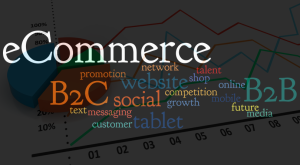Back in January 2012 we posted an article discussing upcoming eCommerce trends for the year. With the end of 2012 just around the corner, let’s go back and revisit those predictions to see how many came to pass. eCommerce sites are a growing asset for both business to consumer (B2C) and business to business (B2B) companies, and in 2010 51% of internet users ordered goods and services online - an amount valued at $15.3 billion. By 2015 this number is expected to increase to $31 billion. On the B2B side of eCommerce, a US survey showed that over the last year approximately 80% of B2B companies have invested in an eCommerce platform, and the importance of eCommerce software for wholesalers and distributors will continue to increase in the future.
The first prediction from the article was the rise of engagement through social media with eCommerce. This prediction partially came true. This past year, 77% of small and medium-sized businesses have used social media for 25% or more of their total marketing efforts (which is an increase from the 50% who were using social media the previous year), yet less than 1% of online purchases are a result of something that the consumer saw posted on a social media site. That being said, 48% of consumers have connected in some way with at least one brand or company on social media, and believe that it is still a great channel for showcasing new products, brands, retailers and trends. Because of this, companies are continuously coming up with creative ways to interact with consumers through social media. For example, a few companies have posted images of prototype products on their Facebook pages and then invited consumers to provide feedback on the products.
The next prediction that was made was an increase in tablet and mobile shopping. With the holiday season approaching and the release of Apple’s iPhone 5 and iPad mini this year, among other factors, experts predict that the number of people who own a tablet will double within the next 3 years. So far in 2012 consumers have spent more than $20.7 billion shopping on their mobile devices – especially tablets, and 65% of B2B executives make business purchases from their mobile devices. Given these numbers and the expected increase in tablet sales, I think it’s safe to predict that the rise of mobile and tablet shopping will continue in the future.
The third prediction was that customer support channels would be changing. Although eCommerce sites have provided consumers with more channels for accessing support such as online chat, text messaging and social networking sites, 90% of consumers prefer to speak with a support representative on the phone. So although eCommerce sites are providing consumers with more channels for accessing support, it is the traditional methods of support communication that most consumers prefer.
The next eCommerce prediction was improvement in the consumer’s website experiences. In 2012 and beyond it will be unacceptable for businesses to have slow, out-dated websites and many companies have already begun to realize this. It is rare that you come across a website that loads slowly, has out-dated images, and uses flash, and those websites that still include these imperfections will become overshadowed by their up-to-date counterparts. In addition many websites are taking a page from Apple’s book with simple design structure and more and more websites are becoming mobile friendly to keep up with tablet and mobile device users.
The last eCommerce predication was that recruiting candidates to help your business evolve with the trends mentioned above would be difficult, and using resources from an outside organization might be necessary. Although there hasn’t seemed to be a lack of skilled talent available this year, new technology creates new job titles and positions. Keeping up-to-date with these changing trends will be imperative for businesses looking to grow in the future.
Overall most of the eCommerce predictions came true, and it is obvious that eCommerce has huge implications for businesses in the US and Canada. Keeping up with these trends by investing in technology and software that caters to each type of consumer and channel of communication will help businesses continue to grow their eCommerce offerings.










